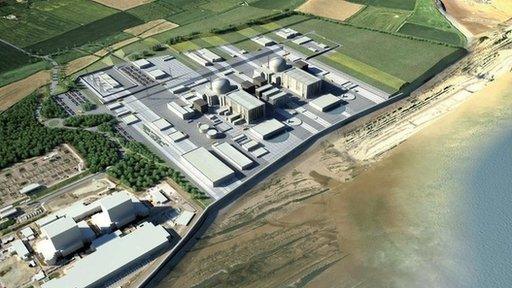Europe backs Hinkley nuclear plant
- Published

A new £24.5bn nuclear power station at Hinkley Point in Somerset is to go ahead after it received final approval from European Union regulators.
The European Commission said, external Britain had agreed to "modify significantly" the financing for the project, reducing the burden on British taxpayers.
In total 16 commissioners voted in favour of the project, just ahead of the 15 votes needed for approval.
EDF Energy is due to build the plant, the first in the UK in almost 20 years.
The Commission had been examining whether the funding for the project broke state aid rules.
However, it said the changes agreed by the British authorities would cut the subsidy by more than £1bn, meaning that state aid would remain "proportionate to the objective pursued, avoiding any undue distortions of competition".
The Commission said these changes made meant gains generated by the project would be better shared with UK consumers.
It estimated the project would now cost £24.5bn to build. The updated figure, much higher than the government and EDF's original £16bn forecast, includes the impact of inflation as well as interest costs for the 10 year construction period.

Analysis: Chris Morris, BBC News, Brussels
This is the first time that the European Commission has approved significant state aid for a new nuclear power plant - and as such, it is a big step forward for the European nuclear industry.
The decision will serve as a precedent for other countries, such as Poland and the Czech Republic, that want to know how much public money they can offer to companies as they look to expand their nuclear industries.
But the legal fight over the funding for Hinkley Point C is almost certainly not over. The European Court of Justice will be asked for an opinion.
Austria says the Commission's decision is supported by neither economic nor ecological sense.
And other member states are concerned that it flies in the face of the EU's stated aim of promoting renewable energy sources, such as wind and solar.

Profit share deal
The government had already agreed that French firm EDF will be paid a so-called "strike price" of £92.50 for every megawatt hour of energy Hinkley C generates. This is almost twice the current wholesale cost of electricity, but this was a deliberate attempt by the government to compensate for the high cost of building the plant.
However, the Commission said that if EDF's overall profits exceeded the rate estimated at the time it was awarded the contract, any gains would be shared with the public.
It said it had also defined a second, higher threshold above which the public would be given more than half of the gains, through lowering the cost of the "strike price".
"An increase in the profit rate of only one percentage point, for example, will generate savings of more than £1.2bn," it said.
It said this agreement would now last for the entire lifetime of the project - an estimated 60 years.
"These modifications will also achieve significant savings for UK taxpayers. On this basis and after a thorough investigation, the Commission can now conclude that the support is compatible with EU state aid rules," said Commission Vice-President Joaquin Almunia.
The two reactors planned for Hinkley, which will provide power for about 60 years, are a key part of the coalition's drive to shift the UK away from fossil fuels towards low-carbon power.
The nuclear power station is expected to begin operating in 2023.
The government estimated last year that with new nuclear power - including Hinkley - the average energy bill in 2030 will be £77 lower than it would have been without the new plants.
Controversy
The decision was controversial, with green critics believing that the government should have offered subsidies to renewable energy sources, such as wind and solar energy.
Austria, which strongly supports green energy, has threatened to take the European Commission to the European Court of Justice to protest against the decision.
"There is absolutely no legal, moral or environmental justification for turning taxes into guaranteed profits for a nuclear power company whose only legacy will be a pile of radioactive waste," said Greenpeace's EU legal adviser, Andrea Carta.
However, Lord Hutton of Furness, chairman of the Nuclear Industry Association, said the Commission's approval was "an important step".
"This will set in train an important time for the nuclear sector in the UK as new build projects get under way to replace the current ageing generation. It also gives certainty to other European countries looking at the UK system of contracts for difference as a mechanism to secure their own supply."